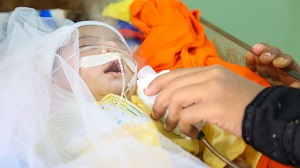3 million children born into war in Yemen
More than 3 million children have been born in Yemen since the escalation in violence in March 2015 according to a new UNICEF report. Born into War details how children in Yemen have been scarred by years of violence, displacement, disease, poverty, undernutrition and a lack of access to basic services including water, health care and education.

An infant who was born prematurely receives treatment in Alsadaqah Hospital, Aden, Aden Governorate, Yemen.
“An entire generation of children in Yemen is growing up knowing nothing but violence. Children in Yemen are suffering the devastating consequences of a war that is not of their making,” said Meritxell Relano, UNICEF Representative in Yemen. “Malnutrition and disease are rampant as basic services collapse. Those who survive are likely to carry the physical and psychological scars of conflict for the rest of their lives.”
According to the report:
• More than 5,000 children have been killed or injured in the violence – an average of five children every day since March 2015.
• More than 11 million children now need humanitarian assistance – nearly every child in Yemen.
• More than half of the country’s children don’t have access to safe drinking water or adequate sanitation.
• An estimated 1.8 million children are acutely malnourished, including nearly 400,000 severe acutely malnourished children who are fighting for their lives.
• Nearly 2 million children are out of school, including almost half a million who dropped out since the conflict escalated in March 2015.
• Suspected cholera and acute watery diarrhea have affected over 1 million people, with children under 5 years old accounting for a quarter of all cases.
• Three quarters of all girls are married before the age of 18.
• Health workers and teachers have been only partially paid for over a year, affecting education for 4.5 million children. Less than half of health facilities are fully functional.
• At the end of September 2017, 256 schools were reported totally destroyed, 150 schools were occupied by displaced people, and 23 by armed groups.
Even before the conflict escalated in 2015, Yemen was the poorest country in the Middle East and among the poorest in the world. Yemen has suffered decades of conflict, under- development, economic decline, and the destruction of fragile public infrastructure and services. Most children and families survive only thanks to humanitarian assistance.
The report calls on all parties to the conflict, those with influence on them and the global community to prioritise the protection of children in Yemen by:
• Immediately reaching a peaceful political solution and putting an end to the violence.
• Abiding by their obligations under international humanitarian law to protect children unconditionally during conflict.
• Providing sustainable and unconditional access to deliver assistance to every child in need in Yemen. Restrictions on imports of goods into Yemen must be lifted. Food and fuel are essential to counter the threat of famine and to power hospitals and vital water systems.
• Preventing the total collapse of public social services including health care, water systems and education. Salaries for health workers and teachers need to be paid.
• Providing sufficient funds for assistance to be sustained. In 2018, UNICEF is appealing for US$ 312 million to continue responding to the urgent needs of children in the country.
Source:United Nations Children's Fund
- 219 reads
Human Rights
Ringing FOWPAL’s Peace Bell for the World:Nobel Peace Prize Laureates’ Visions and Actions

Protecting the World’s Cultural Diversity for a Sustainable Future

The Peace Bell Resonates at the 27th Eurasian Economic Summit

Declaration of World Day of the Power of Hope Endorsed by People in 158 Nations

Puppet Show I International Friendship Day 2020

